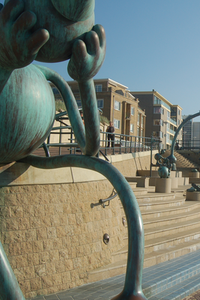Terrorism: A Study in Scarlet

In the field of Political Science, there are no fewer than six subfields: American Political System, Legalism, Normative Theory, Methodology, International Relations, and Comparative Politics. The two introductory courses you may have taken, PLS101 and PLS121, gave broad brush strokes over all of these topics. PLS105 (Introduction to World Politics) delved into the topic of international relations more deeply. It offered what amounted to broad brush strokes of the entire IR subfield. This current course examines one specific aspect of world politics-that dealing with the causes and effects of terrorist activity.
The underlying purpose for this year's course is to train you to be better terrorism researchers. This necessitates that you learn how to become better researchers. Some of you have taken the research methods sequence in the department. Some of you have not. If you have, think of this course as being a refresher and an extender. If you have not, think of this course as being an introduction to doing Political Science research.
Required Texts
There are no required texts for this course. All readings will come from journals and chapters from reserved books you can find in the Alumni Library.
Required Activities
In addition to attending every class period, students are expected to deport themselves as professionals. This means that all readings, extensive though they may be, are read and digested; questions about the materials are formulated; and extensions to the topics to be covered are considered. Make no mistake about it: This is a graduate-level course. There are two scheduled extended quizzes, one scheduled examination (the final), four major assignments, and a variety of in-class exercises designed to force you to grapple with some of the complexities of terrorism research.
In addition to the two graded quizzes, I will give quizzes throughout the semester solely for your own edification. These quizzes serve as check-points for the knowledge covered in the course and as warning of what I would expect you to be able to do in a real quizzing situation.
Personal Thoughts
If you joined this class thinking it would be a place to sit around and condemn terrorist actions, you are in the wrong place. We are here to understand why they do it and how to keep them from doing it. I am assuming that we do want to keep it from happening. There is a very compelling moral argument that concludes terrorist activities are not immoral and do serve the common good. If you would like to have that discussion, I'll be happy to have it with you outside of class.
The field of terrorism research has grown substantially since the early 1980s, when Martha Crenshaw was forced to publish in a general-purpose journal. Today, two scholarly journals focus almost exclusively on the subject-Terrorism and Political Violence and Studies in Conflict and Terrorism. Both are published by Taylor and Francis. Neither one, however, is carried by either JSTOR or Reinert-Alumni. Do not think ill of the university. The annual cost is $643.00 for the former; $1171.00 for the latter.
![flag [=]](http://www.kvasaheim.com/flags/flag15-es-bas.png) 19 2008.
19 2008.